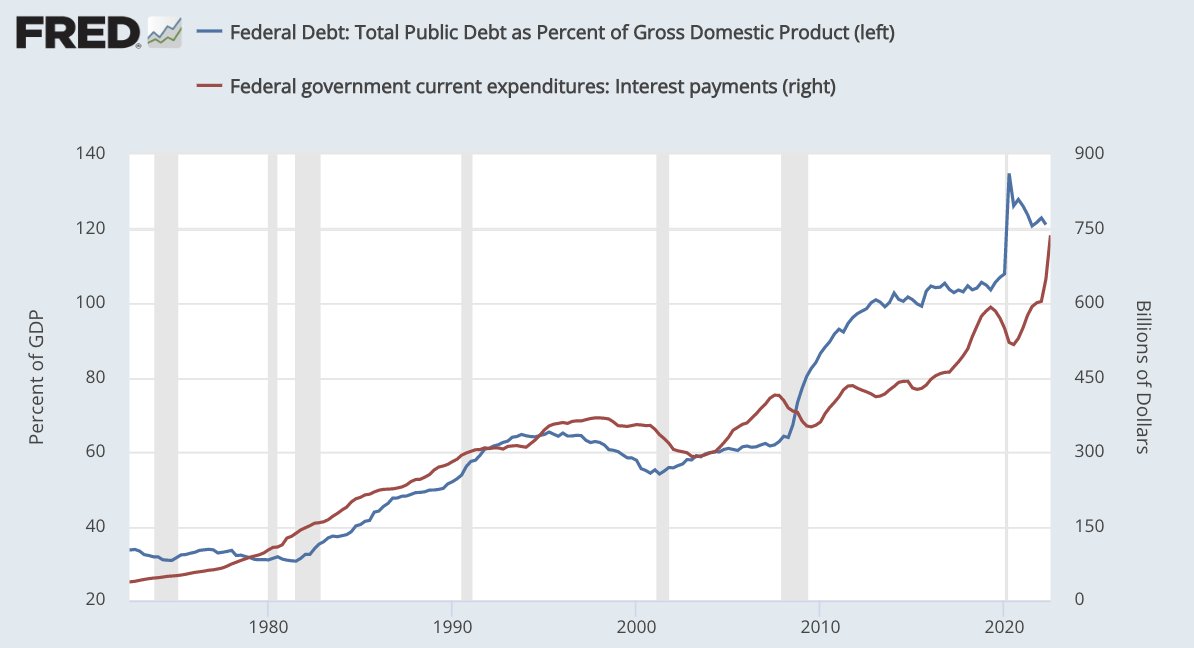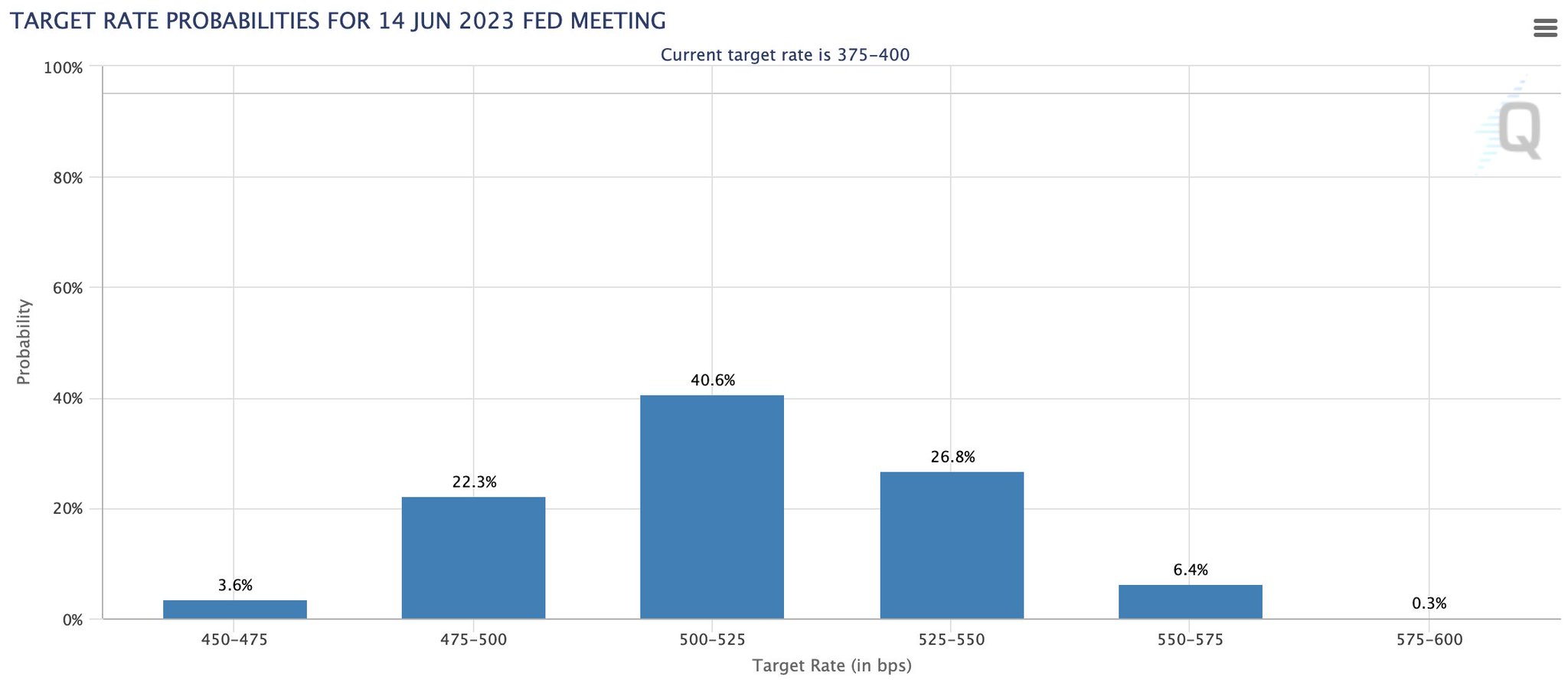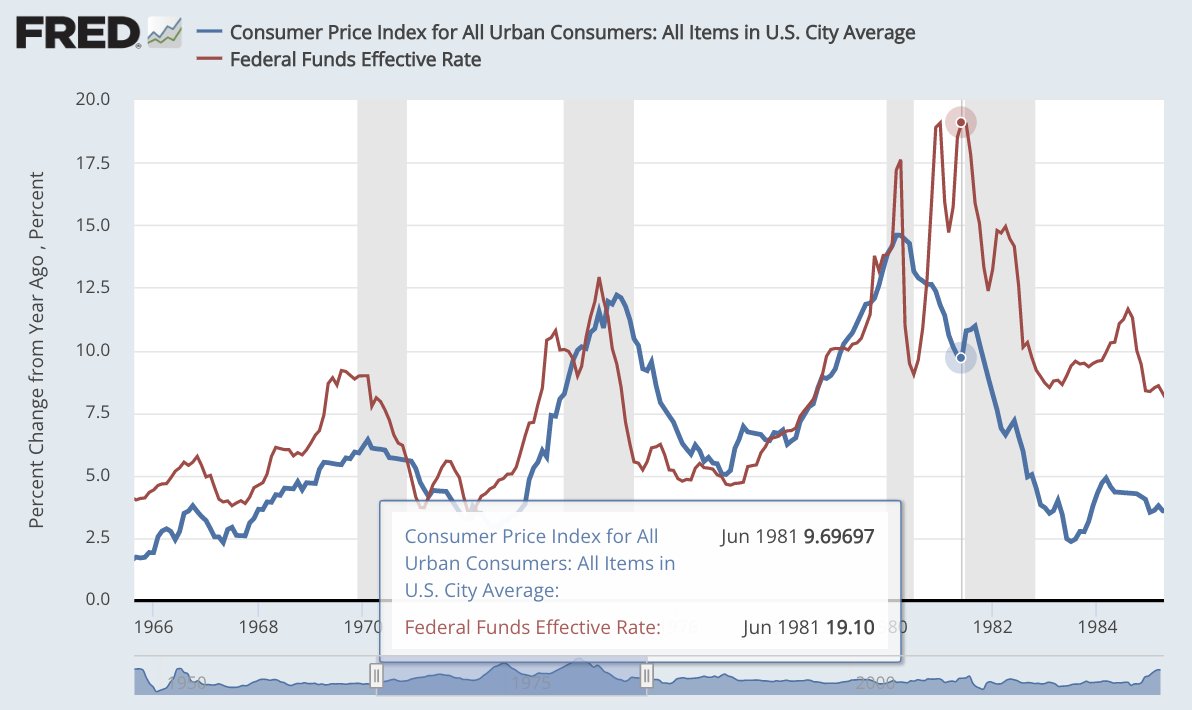Thread by Max Anderson
- Tweet
- Nov 3, 2022
- #CentralBank #Inflation
Thread
The Fed just gave *big* guidance
They plan to take rates to 5%+
And hold them there for most of next year, until they've "defeated" inflation
Here's why this won't work
(according to basic math) 👇
They plan to take rates to 5%+
And hold them there for most of next year, until they've "defeated" inflation
Here's why this won't work
(according to basic math) 👇
In 2019, pre-pandemic, debt service accounted for 13% of our federal budget
#4 biggest line item
2019 Budget:
🏥 Healthcare: $1,240bn
🧓🏼 Pensions: $1,100bn
🪖 Defense: $940bn
❌ Debt Service: $580bn ⚠️
👪 Welfare: $370bn
📚 Education: $150bn
🚀 NASA: $22bn
#4 biggest line item
2019 Budget:
🏥 Healthcare: $1,240bn
🧓🏼 Pensions: $1,100bn
🪖 Defense: $940bn
❌ Debt Service: $580bn ⚠️
👪 Welfare: $370bn
📚 Education: $150bn
🚀 NASA: $22bn
This was up from 10% in the prior decade
Previously #5 biggest line item
2009 Budget, for comparison:
🪖 Defense: $790bn
🏥 Healthcare: $760bn
🧓🏼 Pensions: $730bn
👪 Welfare: $420bn
❌ Debt Service: $350bn ⚠️
📚 Education: $90bn
🚀 NASA: $18bn
Previously #5 biggest line item
2009 Budget, for comparison:
🪖 Defense: $790bn
🏥 Healthcare: $760bn
🧓🏼 Pensions: $730bn
👪 Welfare: $420bn
❌ Debt Service: $350bn ⚠️
📚 Education: $90bn
🚀 NASA: $18bn
That increase in debt service costs wasn't great
It meant fewer and fewer of our tax dollars could go towards the things that are actually supposed to add value to our lives
But it was at least manageable
And for the most part, we learned to live with it
It meant fewer and fewer of our tax dollars could go towards the things that are actually supposed to add value to our lives
But it was at least manageable
And for the most part, we learned to live with it
But then 2020 happened
We had a crisis
And went a lil' spend-crazy
We may or may not have maxed out our credit card, to the tune of a whopping 135% debt / GDP 🔵
It was giga fun while it lasted
But 2 years later, that bill is finally coming due 🔴
We had a crisis
And went a lil' spend-crazy
We may or may not have maxed out our credit card, to the tune of a whopping 135% debt / GDP 🔵
It was giga fun while it lasted
But 2 years later, that bill is finally coming due 🔴
Don't get me wrong, zero interest rates were a god damn good time
It felt amazing. Downright orgasmic 💦
But, sadly, nothing good lasts forever
0% turned into 4%
On its way to 5%
Really, really f*cking quick
It felt amazing. Downright orgasmic 💦
But, sadly, nothing good lasts forever
0% turned into 4%
On its way to 5%
Really, really f*cking quick
Now let's fast forward to today, and take a look at the planned 2023 federal budget
And assume we have to pay for this budget at these new higher interest rates
That $31 trillion of debt we racked up might start to get a lil' spicy🌶️
This should be fun
And assume we have to pay for this budget at these new higher interest rates
That $31 trillion of debt we racked up might start to get a lil' spicy🌶️
This should be fun
At 4% interest, our debt svc cost grows to 22% of the planned federal budget
#3 biggest line item
2023 Budget (@ 4%):
🏥 Healthcare: $1,640bn
🧓🏼 Pensions: $1,370bn
❌ Debt Service: $1,250bn ⚠️
🪖 Defense: $1,170bn
👪 Welfare: $510bn
📚 Education: $240bn
🚀 NASA: $26bn
#3 biggest line item
2023 Budget (@ 4%):
🏥 Healthcare: $1,640bn
🧓🏼 Pensions: $1,370bn
❌ Debt Service: $1,250bn ⚠️
🪖 Defense: $1,170bn
👪 Welfare: $510bn
📚 Education: $240bn
🚀 NASA: $26bn
Spicy indeed
But arguably, still manageable
But arguably, still manageable
Worth noting tho:
w/ 22% of fed budget consumed by debt svc, to get the same level of services the government provided you pre-pandemic, your taxes have to go up by ~12%
(unless of course the gov wants to pay for it with even more debt, making the problem worse in future years)
w/ 22% of fed budget consumed by debt svc, to get the same level of services the government provided you pre-pandemic, your taxes have to go up by ~12%
(unless of course the gov wants to pay for it with even more debt, making the problem worse in future years)
Now let's try 5% 😈
Debt service grows to 27% of the planned federal budget
#2 biggest line item
2023 Budget (@ 5%):
🏥 Healthcare: $1,640bn
❌ Debt Service: $1,560bn 🔥
🧓🏼 Pensions: $1,370bn
🪖 Defense: $1,170bn
👪 Welfare: $510bn
📚 Education: $240bn
🚀 NASA: $26bn
Debt service grows to 27% of the planned federal budget
#2 biggest line item
2023 Budget (@ 5%):
🏥 Healthcare: $1,640bn
❌ Debt Service: $1,560bn 🔥
🧓🏼 Pensions: $1,370bn
🪖 Defense: $1,170bn
👪 Welfare: $510bn
📚 Education: $240bn
🚀 NASA: $26bn
Extra spicy 🌶️🌶️
If you want the same services (and your government to remain solvent), your taxes go up by ~19%
Ouch.
If you want the same services (and your government to remain solvent), your taxes go up by ~19%
Ouch.
Now let's do 5.5%, since the futures market is pricing in a small chance the Fed tries to take us there by middle of next year:
At 5.5%, debt service grows to 30% of the planned federal budget
Line item numero uno 🥇
2023 Budget (@ 5.5%):
❌ Debt Service: $1,720bn 🔥🔥
🏥 Healthcare: $1,640bn
🧓🏼 Pensions: $1,370bn
🪖 Defense: $1,170bn
👪 Welfare: $510bn
📚 Education: $240bn
🚀 NASA: $26bn
Line item numero uno 🥇
2023 Budget (@ 5.5%):
❌ Debt Service: $1,720bn 🔥🔥
🏥 Healthcare: $1,640bn
🧓🏼 Pensions: $1,370bn
🪖 Defense: $1,170bn
👪 Welfare: $510bn
📚 Education: $240bn
🚀 NASA: $26bn
$1.7 trillion, just to pay the interest on our debt, for a single year
Fun stuff
Your taxes go up by 24%
Fun stuff
Your taxes go up by 24%
By now, it's probably becoming clear how difficult it would be for the Fed to hold rates much higher than ~5% for any significant period of time
Go much above there, and stay for long, things break badly
Now, let's move on to the part about the Fed's plan to defeat inflation
Go much above there, and stay for long, things break badly
Now, let's move on to the part about the Fed's plan to defeat inflation
You already know the Volcker Fed had to go to great lengths to defeat our last major inflationary episode in the 70's to early 80's
But let me remind just how far they went
Each time inflation spiked up, they had to raise rates well *above* prevailing CPI @ the time to beat it
But let me remind just how far they went
Each time inflation spiked up, they had to raise rates well *above* prevailing CPI @ the time to beat it
In fact, in Jun 1981, to finally kill the 70's inflation for good, Volcker had to raise Fed Funds to a peak of 19.1%
Nineteen-point-one percent
Roughly *double* the 9.7% CPI at the time
Nineteen-point-one percent
Roughly *double* the 9.7% CPI at the time
Now, just for fun, let's see what Fed Funds at ~double the current CPI would do to our future federal budget
CPI has been hovering around 8%, so we'll use 16% as our inflation-annihilating Fed Funds Rate for this example
CPI has been hovering around 8%, so we'll use 16% as our inflation-annihilating Fed Funds Rate for this example
At 16% interest, debt service would become 86% of the planned federal budget
2023 Budget (w/ 16% Treasury yields):
❌ Debt Service: $5,000bn 💀
🏥 Healthcare: $1,640bn
🧓🏼 Pensions: $1,370bn
🪖 Defense: $1,170bn
👪 Welfare: $510bn
📚 Education: $240bn
🚀 NASA: $26bn
2023 Budget (w/ 16% Treasury yields):
❌ Debt Service: $5,000bn 💀
🏥 Healthcare: $1,640bn
🧓🏼 Pensions: $1,370bn
🪖 Defense: $1,170bn
👪 Welfare: $510bn
📚 Education: $240bn
🚀 NASA: $26bn
And just for some comic relief
If you want to get the same services from your government, your taxes *sextuple*
The avg American, earning the median household income of $78,000, would need to pay $116,000 per year in taxes
If you want to get the same services from your government, your taxes *sextuple*
The avg American, earning the median household income of $78,000, would need to pay $116,000 per year in taxes
I'm no expert in math, but I think that might not work
Unless, of course, we're using alternate-universe Federal Reserve math, in which case it makes total sense
Unless, of course, we're using alternate-universe Federal Reserve math, in which case it makes total sense
Of course I've made many over-simplifications here
Much of the gov's debt is locked in on longer durations, and doesn't immediately need to be rolled over at these higher rates
But the principles discussed still hold
Much of the gov's debt is locked in on longer durations, and doesn't immediately need to be rolled over at these higher rates
But the principles discussed still hold
With $31 trillion in outstanding debt, there's a fundamental ceiling on how high rates can go before everything breaks
At > 100% debt / GDP, that ceiling isn't very high, and we're already close to it now
So yeah - in short, JPow's job is shittier than yours
At > 100% debt / GDP, that ceiling isn't very high, and we're already close to it now
So yeah - in short, JPow's job is shittier than yours
❤️ or RT if you're now as jaded as me 🥲
Want to know the Fed’s *actual* goal around inflation?
Here you go 👇
Here you go 👇
Mentions
See All
Greg Foss @FossGregfoss
·
Nov 3, 2022
Problem is we don’t consider the law of diminishing returns in this excellent analysis. As tax rates rise, tax revenues can actually DECLINE as more of the economy moves underground. Some would argue we are already at max tax rates before diminishing returns sets in. #btc




